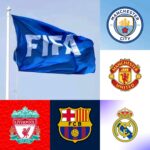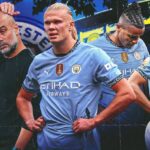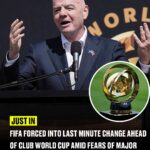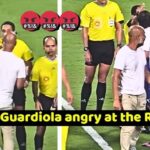£56m star has been playing a key role in helping Man City’s new signings settle in
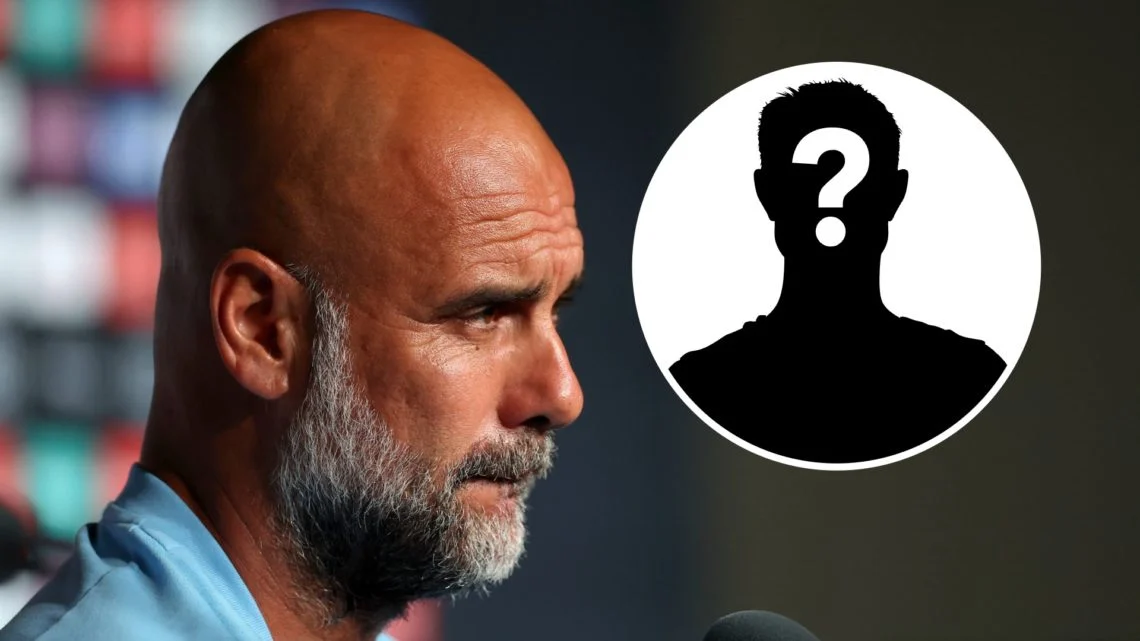
As Manchester City prepares for the 2025/26 season, the club finds itself at a fascinating crossroads of ambition and uncertainty. Following their recent participation in the FIFA Club World Cup, several narratives have emerged that paint a complex picture of Pep Guardiola’s evolving squad. The summer transfer window has brought significant reinforcements, while simultaneously raising questions about certain players’ futures at the Etihad Stadium.
The legendary Catalan manager entered this transfer window with clear objectives: to strengthen his squad with four to five new acquisitions. The Manchester City hierarchy has responded admirably, delivering on Guardiola’s vision with the arrivals of Rayan Cherki, Tijjani Reijnders, Rayan Ait-Nouri, and Marcus Bettinelli. However, the club’s ambitions extend beyond these additions, with plans to secure a right-back before the season commences
Manchester City’s approach to the summer transfer market reflects their continued commitment to excellence and strategic planning. The acquisition of Rayan Cherki represents a significant coup for the Premier League giants, as the young French talent brings creativity and flair to an already formidable attacking arsenal. His technical ability and vision align perfectly with Guardiola’s philosophy of possession-based football and intricate passing combinations.
Tijjani Reijnders’ arrival from AC Milan adds another dimension to City’s midfield options. The Dutch international’s versatility and tactical intelligence make him an ideal fit for Guardiola’s system, where players are expected to adapt to multiple positions and roles depending on the game situation. His experience in Serie A and international football provides the squad with additional depth and quality in the middle of the park.
The signing of Rayan Ait-Nouri addresses a crucial need for defensive reinforcement. The Algerian left-back’s pace and attacking instincts offer Guardiola another weapon in his tactical arsenal, while his defensive solidity ensures that City maintain their high standards of defensive organization. His ability to contribute both defensively and offensively epitomizes the modern full-back role that Guardiola has helped popularize in contemporary football.
Marcus Bettinelli’s arrival as a goalkeeper provides essential squad depth and competition for places. His experience and reliability ensure that City have adequate cover in this crucial position, reflecting the club’s attention to detail in squad construction.
Despite these successful acquisitions, Manchester City’s transfer business remains incomplete. The search for a right-back continues, as Guardiola seeks to add further depth and quality to his defensive options. This pursuit reflects the manager’s perfectionist approach and his understanding that squad depth is crucial for competing across multiple competitions throughout the demanding season ahead.
One of the most intriguing storylines to emerge from Manchester City’s recent FIFA Club World Cup campaign concerns Jeremy Doku’s evolving role within the squad. The Belgian winger, who arrived at the Etihad Stadium from Rennes for £56 million during the summer of 2023, has experienced a somewhat inconsistent journey since his high-profile transfer.
Doku’s performances have been characterized by moments of brilliance interspersed with periods of adaptation to Guardiola’s demanding tactical system. However, his contribution during the Club World Cup extended far beyond his on-field displays, revealing a different dimension to his value within the squad structure.
The 23-year-old winger has emerged as an unexpected cultural ambassador within the Manchester City dressing room, playing a crucial role in helping new signings integrate into the squad’s social and tactical framework. This responsibility has proven particularly valuable given the international nature of Guardiola’s squad and the linguistic challenges that can arise when players from diverse backgrounds come together.
Doku’s multilingual abilities have proven invaluable in this regard. Working alongside Pep Lijnders, Guardiola’s trusted assistant, Doku has facilitated communication between new signings and the established squad members. Their combined linguistic repertoire encompasses English, Dutch, French, Portuguese, and Spanish, effectively covering the communication needs of virtually every player in Guardiola’s squad.
This linguistic bridge-building has contributed significantly to the relaxed and positive atmosphere that characterized Manchester City’s Club World Cup campaign. The ability to communicate effectively in multiple languages has helped new signings feel more comfortable and integrated, potentially accelerating their adaptation to both the tactical demands and cultural expectations of playing for one of world football’s elite clubs.
The importance of such integration cannot be overstated in modern football, where squad harmony and understanding often prove as crucial as individual talent. Doku’s willingness to take on this responsibility demonstrates his maturity and commitment to the collective success of the team, qualities that extend beyond his contributions on the pitch.
Manchester City’s FIFA Club World Cup campaign provided fascinating insights into the squad’s dynamics and the players’ personalities away from the intense pressure of Premier League competition. The tournament’s setting in Florida offered the perfect backdrop for squad bonding and relaxation, elements that are often overlooked but prove crucial for team cohesion throughout a demanding season.
The location in Florida provided Manchester City’s players with numerous opportunities to unwind and strengthen their relationships away from the training ground. The proximity to Miami, approximately 45 minutes from their base, allowed several squad members to explore South Beach, experiencing a different cultural environment while maintaining their physical preparation for matches.
Golf emerged as a particularly popular pastime among the players, reflecting a common recreational activity that transcends cultural and linguistic barriers. These golf outings provided opportunities for informal bonding and relationship-building that can prove invaluable during challenging periods of the season when squad unity becomes paramount.
The diversity of recreational activities chosen by different players revealed interesting insights into their personalities and preferences. Savinho and Rodri’s preference for table tennis showcased their competitive spirits extending beyond football, with both players reportedly establishing themselves as the squad’s most skilled practitioners of the sport. This friendly competition added another layer to the squad’s social dynamics and provided entertainment during downtime.
The approach to entertainment and relaxation varied significantly among squad members, reflecting their individual personalities and preferences. Some players chose to remain engaged with football by watching other matches in the competition, demonstrating their continued passion for the sport even during recreational time. Nico Gonzalez’s interest in Urawa Red Diamonds’ performance against River Plate illustrated this football-focused mindset.
Conversely, other players opted for complete disconnection from football-related activities. Josko Gvardiol’s choice to bring crossword puzzles and minimize outdoor activities in the Florida heat demonstrated a more cautious approach to energy conservation, reflecting the professional mindset required at the highest level of football. His preference for mental rather than physical recreation during downtime showcased the varied approaches players take to maintain their sharpness and readiness.
Oscar Bobb’s basketball sessions with Guardiola’s coaching staff represented another fascinating aspect of the squad’s recreational activities. These interactions between players and coaching staff in informal settings can strengthen relationships and communication, potentially improving on-field understanding and tactical execution. The willingness of coaching staff to engage in recreational activities with players demonstrates the holistic approach to team management that characterizes successful modern football operations.
Perhaps the most concerning narrative to emerge from Manchester City’s Club World Cup campaign concerns the limited involvement of Nico Gonzalez, whose future at the club has become a subject of intense speculation among supporters and observers. The Portuguese midfielder’s situation exemplifies the challenges faced by expensive signings when they struggle to establish themselves in elite squads.
Gonzalez’s arrival at Manchester City during the January 2025 transfer window represented a significant investment, with the club reportedly paying £50 million to secure his services from FC Porto. The signing was driven by the serious injury to Rodri, which had exposed City’s vulnerability in the defensive midfield position and highlighted the need for immediate reinforcement in this crucial area.
The initial signs were promising for Gonzalez, with Guardiola famously describing him as a “mini Rodri” following an impressive performance against Newcastle United. This comparison to City’s Spanish midfielder, widely regarded as one of the world’s best defensive midfielders, suggested high expectations and confidence in Gonzalez’s ability to fill the void left by Rodri’s absence.
However, the Portuguese midfielder’s subsequent performances have failed to match the standards set in that memorable Newcastle display. The inability to consistently replicate such high-level performances has raised questions about his suitability for Guardiola’s system and his long-term prospects at the club.
The Club World Cup presented Gonzalez with an ideal opportunity to demonstrate his value and stake a claim for regular first-team involvement. With Rodri still working his way back to full fitness following his injury layoff, the tournament could have provided the perfect platform for Gonzalez to showcase his abilities and prove his worth to Guardiola.
Unfortunately for the Portuguese midfielder, his involvement in the tournament was disappointingly limited. A single 61-minute appearance against Al Ain represented the extent of his participation, raising serious questions about his standing within the squad hierarchy and Guardiola’s plans for the upcoming season.
This limited involvement has not gone unnoticed by Manchester City supporters, who have expressed concern about Gonzalez’s future prospects at the club. Social media discussions reveal a growing sense that the midfielder may not be part of Guardiola’s long-term plans, with some fans drawing uncomfortable parallels to other expensive signings who failed to establish themselves at the Etihad Stadium.
The comparison to Kalvin Phillips, another high-profile midfield signing who struggled to make an impact at Manchester City, is particularly concerning for Gonzalez and his supporters. Phillips’ eventual departure after failing to convince Guardiola of his suitability for the system serves as a cautionary tale for expensive signings who struggle to adapt to the demands of playing for one of world football’s most successful clubs.
The arrival of Tijjani Reijnders has further complicated Gonzalez’s situation, adding another high-quality option to Manchester City’s already crowded midfield. The Dutch international’s versatility and tactical intelligence make him a more attractive option for Guardiola, potentially pushing Gonzalez further down the pecking order.
The current midfield hierarchy at Manchester City presents a daunting challenge for Gonzalez to overcome. Established stars like Rodri, when fit, remain automatic selections due to their proven quality and understanding of Guardiola’s system. Ilkay Gundogan’s return to the club added another experienced option, while Bernardo Silva’s versatility allows him to operate effectively in various midfield roles.
Beyond these established stars, Manchester City possess several other midfield options that currently appear ahead of Gonzalez in Guardiola’s thinking. Mateo Kovacic brings experience and tactical discipline, while Rico Lewis offers youth and adaptability. Even Matheus Nunes, despite his own struggles for consistent game time, appears to be viewed more favorably than Gonzalez based on recent selections.
This depth of midfield options, while beneficial for Manchester City’s competitive prospects, creates a challenging environment for players seeking regular playing time. The competition for places is intense, and only those who consistently demonstrate their value in training and limited match opportunities are likely to establish themselves in Guardiola’s first-choice selections.
Manchester City’s need to manage their squad size and wage bill adds another layer of complexity to Gonzalez’s situation. Financial Fair Play regulations and practical squad management considerations require clubs to make difficult decisions about player retention and disposal, particularly when expensive signings fail to justify their transfer fees through consistent performances.
The prospect of Gonzalez departing Manchester City, potentially at a significant financial loss, reflects the harsh realities of modern football transfer markets. Clubs must be prepared to cut their losses when signings fail to work out as planned, rather than persisting with underperforming assets that could hinder squad development and financial efficiency.
The timing of any potential Gonzalez departure would be crucial for both the player and the club. A summer exit would allow him to find a new club where he could secure regular playing time and continue his career development, while enabling Manchester City to reinvest in areas where strengthening is required.
For Gonzalez personally, the situation represents a critical juncture in his career. At his age and stage of development, regular playing time is essential for continued growth and improvement. Remaining at Manchester City without guaranteed opportunities could prove detrimental to his long-term career prospects, regardless of the prestige associated with playing for such a successful club.
The Nico Gonzalez situation also provides insight into Pep Guardiola’s uncompromising management philosophy and his approach to squad building. The Catalan manager has consistently demonstrated throughout his career that reputation, transfer fee, and potential mean little if players cannot adapt to his tactical demands and maintain the standards required for success at the highest level.
Guardiola’s track record includes numerous examples of expensive signings who failed to establish themselves in his teams, reflecting his prioritization of tactical fit and performance over financial investment. This approach, while sometimes criticized for its apparent ruthlessness, has contributed significantly to his success at Barcelona, Bayern Munich, and Manchester City.
The manager’s willingness to make difficult decisions about player futures, regardless of transfer fees or external expectations, demonstrates the professional standards that have made him one of football’s most successful coaches. His focus on collective success over individual considerations ensures that tactical coherence and team performance remain paramount in all squad-related decisions.
As Manchester City prepare for the 2025/26 season, several key themes emerge from their Club World Cup experience and transfer activities. The successful integration of new signings, facilitated by players like Jeremy Doku, provides optimism about the squad’s ability to maintain its competitive edge across multiple competitions.
The continued pursuit of a right-back demonstrates Guardiola’s commitment to squad improvement and his attention to tactical details that could prove crucial in tight matches. The completion of this final piece of transfer business could provide the defensive stability and attacking threat from wide areas that might make the difference in crucial matches throughout the season.
However, the Nico Gonzalez situation serves as a reminder of the challenges and uncertainties that accompany squad management at the highest level. The resolution of his future, whether through improved performances that convince Guardiola of his value or through a transfer that benefits all parties, will be one of the key storylines to monitor as the season approaches.
The broader squad dynamics revealed during the Club World Cup suggest a healthy environment where new signings can integrate effectively while established players maintain their professional standards. The variety of recreational activities and the positive atmosphere described in reports indicate that Manchester City possess the squad harmony necessary for sustained success.
Manchester City’s current situation reflects the complexities of managing a world-class football club in the modern era. The successful acquisition of talented new players demonstrates the club’s continued ambition and strategic planning, while the challenges faced by certain individuals highlight the demanding standards required for success at the highest level.
Jeremy Doku’s emergence as a squad integrator showcases the multifaceted contributions that players can make beyond their on-field performances. His linguistic abilities and willingness to help new signings settle in reflects the kind of character and professionalism that contributes to sustained success in elite football environments.
The Nico Gonzalez situation, while concerning for the player and his supporters, exemplifies the harsh realities of modern football where expensive signings must prove their worth through consistent performances rather than relying on transfer fees or reputation. His future resolution will provide insights into both his own adaptability and Guardiola’s long-term squad planning.
As Manchester City prepare for another challenging campaign across multiple competitions, the foundations appear solid despite the individual uncertainties. The combination of established stars, promising new signings, and strong squad dynamics suggests that the club is well-positioned to compete for major honors once again.
The coming weeks and months will reveal whether the current squad construction proves successful, but the early signs suggest that Manchester City have once again assembled a group capable of competing at the highest level while maintaining the standards of excellence that have characterized their recent success under Pep Guardiola’s guidance.
